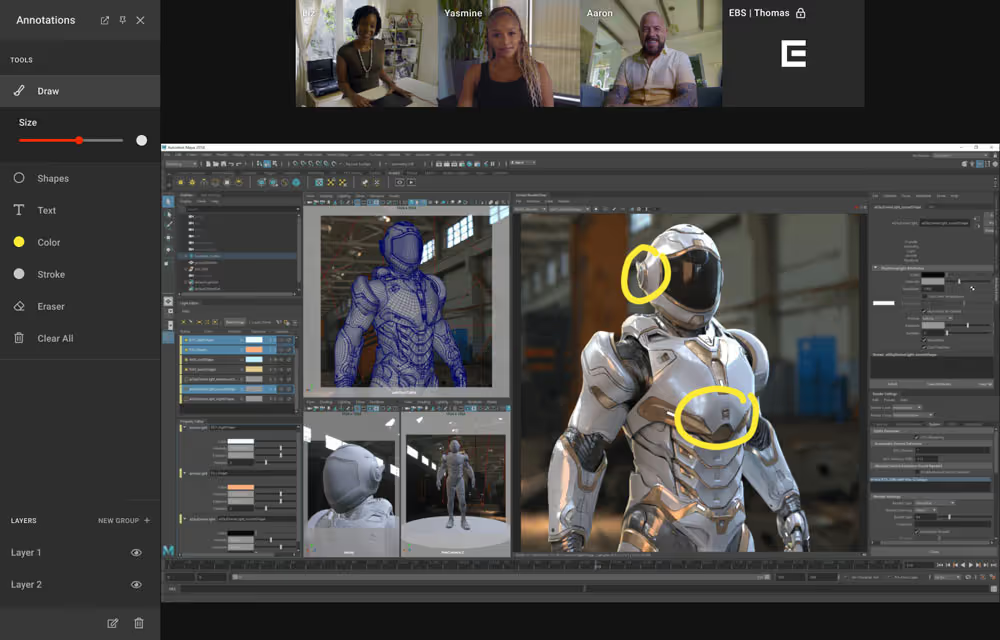Transforming raw files into professional edits is an art. That said, your edits are only as good as your software. Without the right tools for the job, rendering your sequences into polished products becomes unnecessarily complex.
To simplify matters, we’ve put together a roundup guide comparing the best tools in the business. Below, we break down the top tools designed for post-production into 3 categories: video editing, visual effects, and remote collaboration.
Whether you command a team of professional VFX artist or are editing your first home movie, this list of tools should help you find the most fitting software solutions.
What to look for when assessing different post-production tools
The best post-production software for the job will depend heavily on your circumstances. Here are a few factors to take into consideration when selecting the right tools for the job:
- Cost: How often or how long do you anticipate using the software? Post-production tools are accessible on either a subscription basis or with a lump sum fee for a specific software version.
- Day-to-day usage: How often will you be using these tools? Casual users might get away with investing less in full suites, while editing professionals likely need something more robust.
- Collaboration: Does your software facilitate easy collaboration? Do you have that need? It’s worth considering tools with built-in sharing features or opting for a stand-alone solution.
- Versatility: Are you looking for software that does one thing really well or a suite built to conquer it all? If you’re looking to segment your workflow, make sure your software is more or less compatible with the other components of your system.
The 7 best post-production software solutions for every step of the process
Without further ado, here is our guide to the top post-production software suites. From editing to the final rounds of color correction, these software tools are designed to take your project from start to finish.
Video editing software
Here are our top picks for editing software to build your project from the ground up:
1. Adobe Premiere Pro: Most versatile
Adobe’s Premiere Pro is a versatile video editing tool popular among amateurs and pro filmmakers alike. The customizable interface allows you to set up your workflow according to your preferences, making it easy to edit video and audio, add effects, and color your footage with the Lumetri Color panel.
Standout features include multi-camera editing, seamless integration with any other Adobe app, and the ability to edit 360-degree VR content.
Pros:
- Creative Cloud suite has everything necessary to edit files from start to finish.
- Great video stabilization tools
- Excellent for hobbyists and video professionals alike
Cons:
- Stability can vary from one update to the next
- For motion graphics or VFX, users need to purchase the full Creative Cloud suite
Pricing: Individual plans start at $22.99/month or $69.99/month for full Creative Cloud plans, which include the use of Adobe Audition, Lightroom, and After Effects.
2. AVID Media Composer: Best for film and TV editorial
Media Composer, sometimes referred to by the pros as simply “AVID,” is one of the oldest and most trusted non-linear editing (NLE) solutions available, especially for more high-profile film and television editing purposes. It features collaborative tools like bin sharing and project locking, making it great for larger post-production teams.
While it may take a bit more time to understand upfront, it’s incredibly robust, with limitless file-sharing features, script integration, and incredible audio editing capabilities built into the software.
Pros:
- Gold standard NLE for professional editing; workflows geared toward film and broadcast
- Very stable product and user experience
- Once you understand the workflow, the software is incredibly efficient.
Cons:
- Support is tiered; users pay an additional premium to receive on-call support.
- Steep learning curve for beginners
Pricing: Monthly plans start at $39.99/month, with a discount when paying annually.
3. iMovie: Best for beginners
Hobbyists and those just starting their post-production journey might find themselves most attuned to the Apple iMovie platform. This free software is incredibly user-friendly and easy to understand, packed with templates to make your edit process a breeze. It works seamlessly with Apple devices, allowing you to edit on both connected computers and the iOS app.
The software also provides a library of royalty-free sound effects and music, saving creators time and money while building their creations.
Pros:
- Super user-friendly interface
- Great chroma key capabilities for greenscreen
- Built-in templates for simple project inspiration
Cons:
- Only available for Mac users, no comparable software for PC users
- Somewhat limited with only two video tracks, no capability for motion tracking
Pricing: Free on Apple devices
Remote work and collaboration
4. Evercast: Best for remote collaboration
Having the right software to create is one thing, but what about software to collaborate with your post-production team? Evercast is the closest thing to feeling like you’re in the room with collaborators when you need to work remotely.

Made specifically for production, Evercast offers high-resolution 4K video streaming and screen sharing with frame accuracy that simply isn’t available with typical video conferencing tools like Zoom and Google Meet. This way, you and your post-production team can work together effectively from anywhere and everywhere.
Participants don’t need software to join; they just need to click a button to join the session.
Pros:
- All-in-one video conferencing solution with content streaming, chatting, drawing, and recording in one place
- Streams directly from any NLE or other creative software to review and make changes in real time with your team
- Highly secure; received the Gold Shield from the Motion Picture Association's Trusted Partner Network
- Designed specifically for creative professionals with ultra-low latency
- Service backed by 24/7, white-glove support
Cons:
- Requires a one-time setup to streamline your workflow
- Slightly pricier than other collaboration tools
Pricing: Plans start at $549 per month.
Create together remotely, in real time

Visual effects
From motion graphics to VFX, these software suites help you assemble the final finishing touches on your sequence.
5. DaVinci Resolve: Best for color grading
DaVinci Resolve is well-loved for its node-based color correction, making it a standard for colorists, visual effect artists, and some editors. The platform does provide both an editing and motion graphics suite, though it’s used most frequently for color grading.
With automatic color matching, color wheels, curves, and real-time playback, this software makes it easy to picture your project in its final form.
Pros:
- Superior node-based color correction workflow
- Has a video editor and motion graphics suite
- Fast rendering
Cons:
- This is newer software, especially in the editing realm, and other collaborators might be less familiar with the workflow.
- Not designed for complete beginner editors
Pricing: The basic editor is free, or you can purchase the full Studio version for a one-time fee of $295.
6. After Effects: Best for motion graphics
Developed for visual effects, compositing, and manipulating animated elements, After Effects is Adobe's motion graphics software. It supports rotoscoping, keying, and several 3D lighting tools to bring your effects and animations to life.
The software integrates well with Adobe’s Premiere Pro editing software and provides a customizable workflow and custom scripting.
Pros:
- Flexible software that integrates well with Premiere and other Adobe programs
- Used with VFX, compositing, and animation
- Great for beginners and professionals
- Enables custom scripting
Cons:
- Limited 3D support
- Not the most intuitive user interface
Pricing: Individual plans start at $22.99/month or $69.99/month for full Creative Cloud plans.
7. Nuke: Best for compositing and visual effects
If you’re looking for advanced, collaborative, effortlessly professional compositing, then Nuke is the way to go. This industry-standard compositing and visual effects suite has node-based architecture that offers as much flexibility as possible when compositing frame by frame.
Nuke also offers 3D compositing tools and integrates well with animation and modeling software. The user interface is also highly customizable, so updating your workflow according to your preferences is easy.
Pros:
- Gold standard for compositing
- Shot-by-shot, detailed complex processing
- Excellent relighting capabilities
Cons:
- Steep learning curve
- Expensive
Pricing: Yearly subscriptions start at $3,839 for Nuke or $5,219 for the more advanced Nuke X.















.avif)









.avif)


.avif)